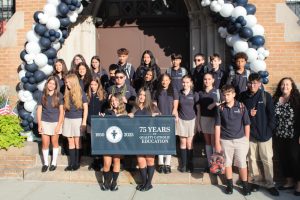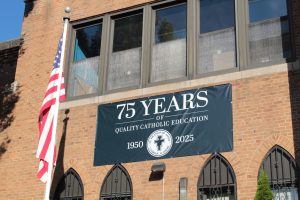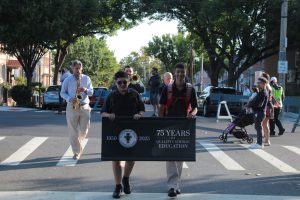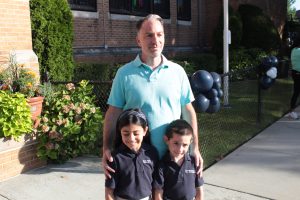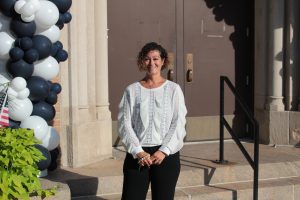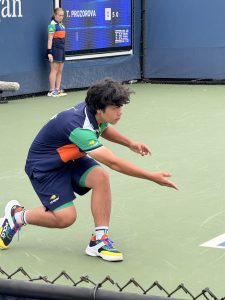Facing eviction from a beloved community garden after a neighbor complained about its values statement, gardeners have accused the City of discriminatory enforcement
COLE SINANIAN
It’s 10am on a bright and breezy late-summer Sunday, harvest season at Jardin de Santa Cecilia Gentili, a community garden in Ridgewood, Queens. Originally named “Sunset Community Garden” due to the view atop its gently sloping hillside, from which the towers of Midtown can be seen bathed in gold at sunset, the garden is already buzzing. Stewards shovel compost and pick cherry tomatoes, bell peppers, purple basil, and other crops available to all members of the community.
“Everyone is welcome here,” says Indalesio Tellez, one of the garden’s few dozen members. “We’ve just started harvesting,” Tellez calls in Spanish to a pair of women passersby pushing strollers. “You’re welcome to come by anytime to pick up some food!” A toddler with a dripping nose, accompanied by a young man wearing a gold Star of David around his neck, reaches giddily for a watering can that’s nearly his size.
Many of the garden’s members hail from Ridgewood’s immigrant, trans and queer communities, and view it as a safe space in a world that’s often hostile to marginalized groups, says Tellez, whose family is from Mexico.
Still, the garden is, first and foremost, a garden. A highly productive one. Piper Werle, who’s been a garden steward for the past year, doesn’t do much shopping for produce anymore. She’s proud to admit that most of her fruits and vegetables come from the garden, planted by either herself or one of her neighbors. In the past year, gardeners have processed nearly 7,000 pounds of kitchen scraps into compost and produced hundreds of pounds of fruits and vegetables, available to all community members.
As a source of pride and community for Werle, Tellez, and dozens of other gardeners, it’s understandable, then, that when she found out the City was evicting the garden, Werle’s reaction was to burst into tears.
It all began when a disgruntled neighbor reported the garden’s values statement — which urges garden members to interrupt “violent behavior or rhetoric that expresses all forms of hate,” including Zionism, anti-semitism, nationalism and transphobia” — to the City’s parks department as discriminatory. After a drawn-out negotiation and several inaccurate hit pieces from The New York Post, the City moved to terminate the garden’s license in May.
In July, a New York County judge called the gardeners’ activities discriminatory — a claim that the gardeners and their lawyers vehemently deny. The garden’s legal team then brought the case to federal court and has since managed to delay eviction until October 3rd. But for Tellez, Werle and the other gardeners, this is about more than just keeping the garden open. The City’s efforts to close the space could set a troubling precedent, they say, where vibrant community spaces are vulnerable to closure at the request of a single well-connected neighbor.
“The City claims to care about community-building, especially around community gardens,” Werle said. “But here is this vibrant, diverse community that’s been built to take care of the land and to feed ourselves, and it feels like they’re trying to tear it apart instead of offering even basic conflict resolution.”
The complaints
Sunset Community Garden sits behind Grover Cleveland High School track and field complex at the intersection of Onderdonk and Willoughby Avenues. According to Carlos Martinez, the director of NYC Parks’ Green Thumb program — which administers the City’s community gardens — the garden originated in funding awarded to the neighborhoods surrounding the Newton Creek Wastewater Treatment Plant.
The funding was secured in a lawsuit against the plant, after which the Ridgewood and Greenpoint communities, guided by the NYC Parks Department, began a yearslong visioning process. Dozens of potential projects were identified, and over 500 people were involved in the discussions. By 2016, Green Thumb had secured $500,000 of funding for a community garden in Ridgewood. After a few more years of discussion between the community and the City, the location was settled and the garden opened in 2023.
A local woman named Christina Wilkinson, who is president of the Newtown Historical Society, was involved in the initial visioning process back in 2016, Martinez said in a recorded meeting with gardeners in April. Werle and Tellez joined the garden in 2023, although by then, Wilkinson was nowhere to be found.
Werle and Tellez said the gardeners decided to draft a series of community values after their first season working together as a way to facilitate collaboration among such a diverse group of people. This is a normal thing to do in communal land stewardship, Werle asserts, and the values were an enormous collaborative effort, the result of six months of surveys, virtual meetings, and in-person discussions among garden members. As the final document — published in the summer of 2024 — notes in its introduction, it is a “living document,” meant to evolve and change as the garden does. Its tenets are a means of ensuring that all who use the garden feel welcome, Werle says.
“That’s why the agreements were made, because we want everyone to feel safe, so we can make decisions in the most productive and healthy ways possible,” she said. “Which is why it’s so ironic that it’s being touted as a tool of exclusion when it was meant to be a method of inclusion.”
The garden’s community values, written in Spanish and English, include a land acknowledgement and a statement of solidarity with oppressed people around the world, including in Palestine. The document ends with the “community agreements” that condemn and identify homophobia, transphobia, sexism, ableism, fatphobia, xenophobia, Zionism, anti-semitism, nationalism, and racism as forms of hate. The values, the gardeners assert, are not a litmus test but democratically agreed-upon epxression of shared values, and are not meant to exclude.
In an affidavit, Jewish garden steward Marcy Ayres explains the sense of community she’s fostered at the garden: “I have never felt any anti-semitism from the garden members, and have only felt support and celebration of my identity and faith,” Ayres writes. “Members of the garden even came to a Passover Seder that I held with my family last year.”
Wilkinson, who had been monitoring the garden’s social media although she was no longer involved, complained to the City in September 2024. According to Martinez in the April meeting, Wilkinson was submitting her complaints through New York City Councilmember Robert Holden, who is known for his pro-Israel stance and with whom Wilkinson has a close relationship.
“Christina Wilkinson has direct access to councilmember Holden, so that’s how we are getting these complaints,” Martinez said. “It’s coming from the top. Basically, we are trapped in the middle.”
When asked via email about the discrimination that spurred her complaint, Wilkinson wrote: “I pointed out that their community values statement was discriminatory and both Parks and a judge agreed with me. There’s nothing further to discuss.” Wilkinson declined to be interviewed for this article.
The Post article
Shortly after submitting her complaints, Wilkinson spoke to The New York Post, and the conservative outlet launched an aggressive attack against the garden, attempting to paint the gardeners as antisemites. Wilkinson had previously appeared in a July 2024 Post article for her support of an initiative to buy headstones for fallen New York City police officers.
The Post’s September 21, 2024 article, which opens with the line “They’re planting hate,” brought immediate threats and harassment to the gardeners. On September 24, 2024, a group of six white men entered the garden and approached two gardeners. The men, who did not identify themselves, began interrogating the gardeners, who happened to be immigrants from Middle Eastern countries.
The men asked how they got their keys to the space and whether they were “pro-Hamas.” Meanwhile, dozens of violent and racist comments began appearing in the Post article’s comment section:
“You know what I like?” read one. “Gasoline and matches. Great for removing weeds.”
“Kilemall,” read another, using an intentional misspelling of “Kill them all” to avoid censors. The commenter continued: “And their families that support them and their terrorism.”
“Table cloth heads and sarin gas go together,” wrote another.
Quoted sources in the article include Wilkinson, who has not set foot in the garden in years, and an Israeli woman named Sarah Schraeter-Mowers, whose name neither Werle nor Tellez recognizes. The Post quotes Mayor Eric Adams in its most recent article, whose campaign to confront the “unprecedented rise in anti-semitism and anti-Jewish hate” has been criticized as a tool to silence constitutionally protected speech.
In a written statement, Niki Cross, one of the attorneys representing the gardeners, suggested the garden may be another victim of the mayor’s crackdown.
“The City is favoring the unjustified and baseless feelings of exclusion of someone it openly admits is a transphobe, and who is openly Zionist (that is, supportive of an explicitly discriminatory and genocidal state) precisely in order to actually exclude and punish anyone who expresses solidarity with oppressed peoples and to remove the trans people of color from the community they have carefully cultivated alongside allies,” Cross wrote. “This is what Mayor Adams means by ‘stamping out hate’—in fact he and the City are illegally stamping out dissent.”
In a text message sent to gardeners on April 23, NYC Green Thumb Assistant Director of Community Engagement Alex Muñoz, described the City’s enforcement as “unfair,” and appeared to refer to Wilkinson as a “transphobe.”
“I’m sorry for everything,” Muñoz wrote. “For the changing requirements, the unfair policies, for empowering a transphobe, and for not being there on the ground as soon as the Post article happened.”
The violations
The violations that the City is enforcing as a result of Wilkinson’s complaints concern the community agreements and a small memorial for Cecilia Gentili, a prominent Argentinian-American trans-rights activist who lived near the garden. When Gentili passed away in February 2024, Tellez and other gardeners who had known her built a 3×3.5 feet tall memorial in the space’s far corner as a way to remember their neighbor.
In September 2024, the City notified the garden that the community agreements constituted an “ideological litmus test” that’s prohibited in NYC Parks’ public spaces.
A few months later, the City told gardeners the Gentili memorial violated NYC Parks’ policy about memorials. The gardeners responded with a clarification that it was in fact an art installation, not a memorial, and was thus subject to NYC Parks’ Arts and Antiquities guidelines. When garden members communicated that they wished for the installation to be permanent, the City suggested either moving the altar to a different space, or subjecting it to a formal approval process that would have it moved to a new space the following year, as large, permanent art installations are prohibited on City land. On May 5, 2025, the City sent the gardeners a termination notice, citing their continued failure to comply with NYC Parks’ public space rules.
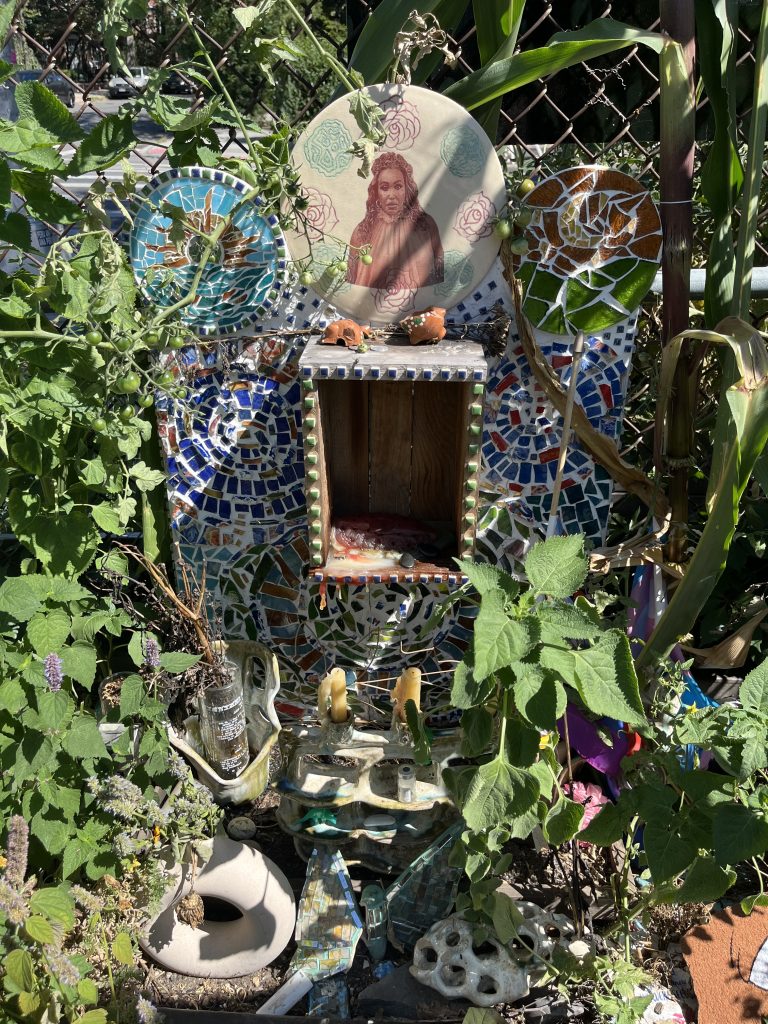
The 3×3.5ft memorial for local trans-rights activist Cecilia Gentili is one of the violations cited in the City’s eviction notice.
Werle, Tellez, and the garden’s legal team, however, point out that small art installations are common throughout the city’s public gardens and are — by the City’s own admittance — rarely enforced. Furthermore, Green Thumb’s community garden handbook states only “large art installations” are subject to the written approval process, while gardeners say Green Thumb has not defined what constitutes “large.”
“We try to turn a blind eye,” Martinez said. “Because we know that you guys having art installations is part of the vibrancy of gardens, but when the powers reach out to us and say, ‘hey, you have illegal activity in the garden,’ unfortunately we need to act.”
On June 4th, the NY Supreme Court granted the garden a temporary restraining order halting immediate eviction, but in a July 18 hearing, NY County Supreme Court Judge Hasa Kingo sided against the gardeners, claiming that the garden’s community values violate the First Amendment.
The gardeners withdrew from the NY case and quickly re-filed in federal court, for which a preliminary injunction hearing has been scheduled for October 3. In a written statement directed at Kingo, garden attorney Jonathan Wallace wrote that the judge “completely misapprehends the First Amendment” by construing the community members who lease the garden as the state itself. Gardeners are no more subject to free speech law than would be private citizens leasing government-owned office space, Wallace writes.
The ‘gift that keeps on giving’
In subsequent press releases, the gardeners claim to have attempted to contact and dialogue with the City since the first notice was sent last September, but struggled to get any meaningful compromise.
Gardeners attempted to meet directly with NYC Parks Department by contacting Public Advocate Jumaane Williams, Ridgewood City Council Member Jennifer Gutierrez, NY State Senator Julia Salazar, and NY State Assembly Member Claire Valdez. The Parks Department ignored requests, and Salazar, Valdez, and Gutierrez condemned Kingo’s statement in a July 24 letter:
“We are deeply troubled by accounts of racist and transphobic harassment against the members of Sunset Garden,” they wrote. “People in our community care and want to enjoy this space without fear or intimidation. We need to come together to ensure this garden remains a place of safety and inclusion, and we urge all parties to work toward that future.“
It is unclear exactly what would happen if the City successfully evicts the gardeners.
What will certainly be lost if the City locks the space in October — a critical time for garden care — are years worth of labor and hundreds of pounds of food. And as attorney Wallace notes in his condemnation of Kingo’s decision, successful eviction of the gardeners could lay the groundwork for similar outcomes in other community gardens. He described the legal precedent as potentially a “gift that keeps on giving,” likely to be cited for years to come “by litigants eager to suppress any criticism of Israel and to establish that trans people, people of color, and immigrants do not warrant the protection of our laws.”
The NYC Parks Department declined to comment through its press officer, Chris Clark, due to the ongoing litigation.










